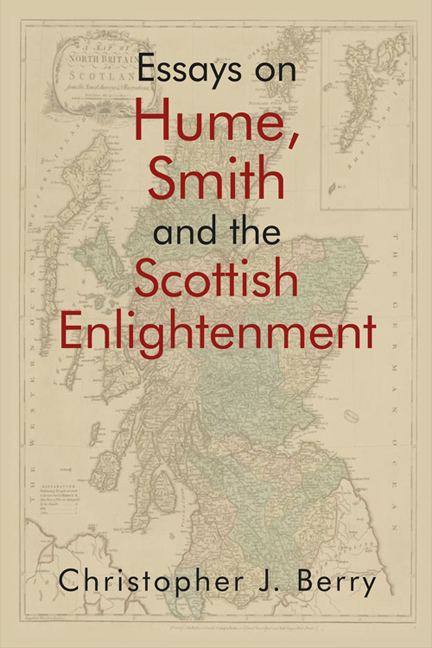6 - Rude Religion: The Psychology of Polytheism in the Scottish Enlightenment
Published online by Cambridge University Press: 06 May 2021
Summary
The idea that human society passes through the ‘four stages’ of hunting, herding, farming and commerce is generally regarded as one of the major contributions of the Scottish Enlightenment. This general regard has not, however, meant any unanimity as to the precise character and significance of that idea. Indeed, a distinct history of interpretation has developed.
The initial emphasis was on the proto-Marxian character of the stadial theme. While Ronald L. Meek is chiefly identified with this emphasis, the ground was broken in English by Roy Pascal, who characterised the ‘Scottish Historical School’ by its ‘materialistic and scientific approach’. In an essay openly indebted to Pascal entitled ‘The Scottish Contribution to Marxist Sociology’, first published in 1954, Meek likewise identified the Scots as proponents of ‘a materialist conception of history’. Although Meek did qualify his initial formulations in subsequent writings, he nevertheless explicitly said about his earlier account that he did not think he was ‘all that wrong in describing this theoretical system [that is, the four stages] as a if not the materialist conception of history’ (1977: 19; Meek italics). A third exponent of this interpretation was Andrew Skinner. Skinner also employed the Marx-derived terminology of ‘productive forces’ (1965: 21) and talked explicitly of an ‘almost Marxian reliance’ in Smith's account upon economic forces (1975: 175). Skinner, however, later wrote an explicit critique of Meek (using the same title as Meek's original 1954 essay but adding a question mark), wherein he stated that Smith was a neither a determinist nor a materialist.
Between Skinner's essays of 1975 and 1982 a shift away from the materialist interpretation occurred. Explanations for such shifts are elusive but it would seem that, on an academic front, Donald Winch's Adam Smith's Politics (1978) had an impact. Winch (1996) restated his views: he was concerned to argue against those interpretations of Smith that read him backwards from the nineteenth century; this included not only Marxists but also ‘Manchester liberals’. Winch combined together three strands. From Quentin Skinner (1969) he took up the emphasis on the need to focus on the historicity of an author's intentions, from John Pocock (1975) he incorporated the significance of the discourse on virtue and corruption, and from Duncan Forbes he adopted the distinction between ‘vulgar’ and ‘sceptical Whiggism’ (1975a, 1975b, 1954).
- Type
- Chapter
- Information
- Essays on Hume, Smith and the Scottish Enlightenment , pp. 88 - 108Publisher: Edinburgh University PressPrint publication year: 2018



